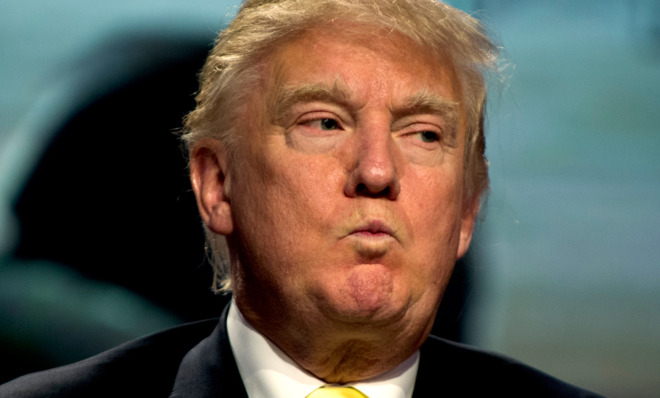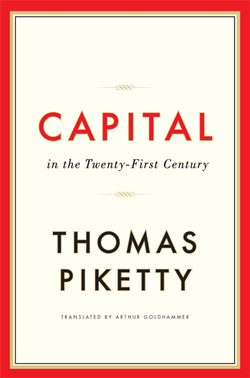America should jack up its top tax rate to 70 percent
The super-rich will barely even feel it. But the rest of us will benefit enormously.

A free daily email with the biggest news stories of the day – and the best features from TheWeek.com
You are now subscribed
Your newsletter sign-up was successful
Thomas Piketty's new book, Capital in the 21st Century, painstakingly details the dynamics of wealth and income inequality throughout the last two centuries, and offers a somewhat grim picture of the future of economic inequality. Along the way, Piketty also offers his theory of the cause of exploding executive pay and how we can successfully combat this destructive trend.
Piketty's solution is to jack up taxes on top incomes to essentially confiscatory rates, as high as 80 percent even. Now, raising taxes on the rich in an effort to reduce inequality is a fairly generic idea. But Piketty's reasoning for why such a tax would be successful is much different from what advocates of such a move usually suggest.

The typical line is that increasing taxes on the rich would reduce their take-home pay while providing public revenues that could be used to increase the take-home pay of others. In this view, increasing taxes on top incomes would not reduce what is somewhat misleadingly called "pre-tax" inequality, but it would reduce "post-tax" inequality.
The Week
Escape your echo chamber. Get the facts behind the news, plus analysis from multiple perspectives.

Sign up for The Week's Free Newsletters
From our morning news briefing to a weekly Good News Newsletter, get the best of The Week delivered directly to your inbox.
From our morning news briefing to a weekly Good News Newsletter, get the best of The Week delivered directly to your inbox.
In Piketty's view, the equalizing effects of such a tax would be much more expansive. A very high top tax rate would not only change the distribution of income after taxes. It would also alter incentives in such a way to change the distribution before taxes.
To understand why, it is necessary to determine why executive pay has exploded so much in the last few decades. In 1978, the top 350 CEOs commanded average compensations of $1.4 million. By 2011, that figure had ballooned to over $12.1 million. In total over that period, CEO pay went from 26.5 times average employee pay to 206 times the average pay. This is an unprecedented pay increase, one that basic economic theories of worker compensation struggle to explain.
In theory, executives, like other employees, are paid based on their marginal productivity. That is, executives receive in income an amount equivalent to the value they contribute to their company. But if this were true, it would mean that somehow executives in America got super-productive a few decades ago, way more productive than they ever were in the past and way more productive than executives in other countries.
This seems very unlikely. What's more likely, according to Piketty, is that top executives are being much more aggressive about demanding higher pay. These demands have been helped along by the fact that corporate governance in America is a joke, with boards often filled by friends or peers of top executives. But more than that, the demands are helped along by the fact that it is basically impossible to meaningfully measure the marginal productivity of top executives. How can you isolate the precise value a CEO adds to a multibillion dollar firm with tens of thousands of employees? The answer is that you can't.
A free daily email with the biggest news stories of the day – and the best features from TheWeek.com
In an atmosphere of uncertainty over how much value executives actually contribute to companies, executive pay — which is a small percentage of overall company costs anyway — can shoot up enormously, especially when the CEO's buddies are the people tasked with voting on these increases.
This explains the mechanism of exploding executive pay. But it does not explain why it has happened now. If the value-add of an executive is hard to assess and corporate governance is weak in America, then why did it take off when it did?
Piketty's answer: Blame the slashing of top tax rates. For much of the 20th century, top tax rates in the U.S. were very high, as much as 90 percent. When almost all of an income increase goes to taxes, there is little reason to demand an exorbitant salary. Under this tax regime, corporate executives still made great salaries and still did their jobs well, but they didn't push as hard to extract as much money from their companies as possible. It just wasn't worth it.
This means re-upping top tax rates — let's say, to a 70 percent top marginal tax rate for incomes over $1 million — would actually cause income to be more equally distributed even before taxes are counted.
Relative to the top rate now (39.6 percent), this might seem high, but we've seen higher. In the middle of the last century, the top marginal tax rate hit as high as 90 percent, and averaged over 80 percent. Moreover, increasing the top rate does not mean that all of a CEO's income would be taxed at 70 percent — just the amount above the $1 million threshold.
Executives would receive much less compensation in such a world, which would reduce the income gap, and also free up money firms currently dedicate to executive pay for other uses, e.g. to increase the compensation of some of its other employees or engage in more research and development.
Jacking up taxes on the very rich would thus provide a double dose of inequality reduction, first by cutting exorbitant pay that has no discernible relationship to the productivity of executives, and second by bringing in tax revenue that could be used to reduce ultimate inequality even further. Debates about such a move often focus solely upon the revenue piece of the policy, with opponents typically pointing out that it would generate only modest revenues. And while this narrow point may be true, it ignores the other half of the argument.
-
 The Olympic timekeepers keeping the Games on track
The Olympic timekeepers keeping the Games on trackUnder the Radar Swiss watchmaking giant Omega has been at the finish line of every Olympic Games for nearly 100 years
-
 Will increasing tensions with Iran boil over into war?
Will increasing tensions with Iran boil over into war?Today’s Big Question President Donald Trump has recently been threatening the country
-
 Corruption: The spy sheikh and the president
Corruption: The spy sheikh and the presidentFeature Trump is at the center of another scandal